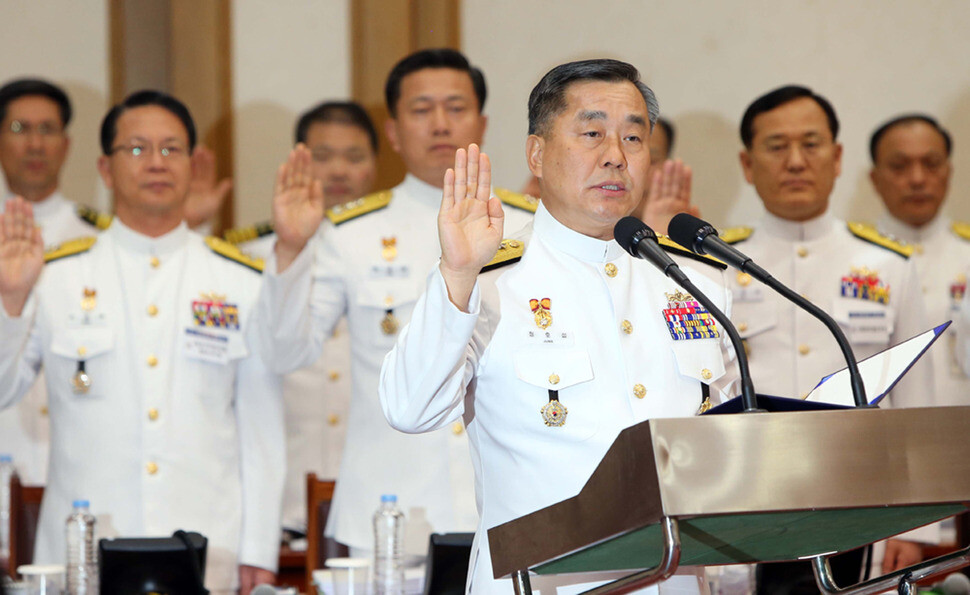hankyoreh
Links to other country sites 다른 나라 사이트 링크
[Reporter’s notebook] Should Japan rearm to ‘deter North Korea’

During the parliamentary audit in the National Assembly’s National Defense Committee on Sep. 22, Navy Chief of Staff Jung Ho-sup, said that Japan needs to take part in the Key Resolve joint military exercises in order to deter North Korea. These remarks are regrettable, even if they only reflect Jung‘s personal opinion.
The Key Resolve drills are joint military exercises that presume a North Korean invasion of South Korea. This would mean that armed members of the Japan Self-Defense Forces (JSDF) would set foot on South Korean soil and train together with South Korean forces. How are we supposed to take this?
Expecting that the remark would spark controversy, the navy sent a text message to reporters explaining the remark as reflecting the standard government policy of needing to cooperate with Japan in the interest of deterring North Korea. This excuse implies that Jung’s remark was a slip of the tongue.
However, it is shocking that a leader of the military could be so careless in official remarks made to the National Assembly. There is a considerable difference between the government‘s policy of military cooperation with Japan and having Japanese troops participate in drills on the Korean Peninsula.
In addition, Japan’s recent enactment of a set of security laws that serve as a legal basis for exercising the right to collective self-defense have increased concerns about the JSDF being deployed on the Korean Peninsula.
When South Korean Defense Minister Han Min-koo was summoned to the National Assembly just a few days ago and lawmakers demanded to know how this could be prevented, he could only repeatedly state that the JSDF would not be able to enter the Korean Peninsula without permission from the South Korean government.
But with a member of the military brass gladly laying the groundwork for the Japanese military returning to the Korean Peninsula, one can’t help but doubt what one is hearing.
Military deterrence against North Korea is not the only standard for security policy. Security cooperation between South Korea and Japan ties into American efforts to expand trilateral cooperation between South Korea, the US, and Japan. Furthermore, it is widely understood that this trilateral cooperation is generally intended to check China.
That was even how most (68.8%) of the ruling Saenuri Party (NFP) lawmakers on the National Assembly’s National Defense Committee responded during a survey that the Hankyoreh carried out last month on the 70th anniversary of Korea’s liberation from Japanese occupation and division into North and South.
If South Korea joins hands with other countries on the pretext of deterring North Korea, it exposes itself to the risk of being used for a different reason altogether - checking China.
Absurdly enough, Korea is the nation that provided Japan with an excuse to rearm with the Korean War, 65 years ago, shortly after it was defeated in World War II. After the Korean War broke out, the US hastened to create the JSDF - enabling Japan to rearm - in order to fill the security vacuum resulting from the deployment of US Forces Japan to the Korean Peninsula.
It’s said that history repeats itself. Even today, the so-called Korea problem - signifying the threat of North Korean nuclear weapons - is serving as an excuse for strengthening the JSDF’s role and for enabling it to exercise the right to collect self-defense. How much longer are we going to help the JSDF increase its influence on the pretext of deterring North Korea?
By Park Byong-su, senior staff writer
Please direct questions or comments to [english@hani.co.kr]

Editorial・opinion
![[Column] Life on our Trisolaris [Column] Life on our Trisolaris](https://flexible.img.hani.co.kr/flexible/normal/500/300/imgdb/original/2024/0505/4817148682278544.jpg) [Column] Life on our Trisolaris
[Column] Life on our Trisolaris![[Editorial] Penalties for airing allegations against Korea’s first lady endanger free press [Editorial] Penalties for airing allegations against Korea’s first lady endanger free press](https://flexible.img.hani.co.kr/flexible/normal/500/300/imgdb/original/2024/0502/1817146398095106.jpg) [Editorial] Penalties for airing allegations against Korea’s first lady endanger free press
[Editorial] Penalties for airing allegations against Korea’s first lady endanger free press- [Editorial] Yoon must halt procurement of SM-3 interceptor missiles
- [Guest essay] Maybe Korea’s rapid population decline is an opportunity, not a crisis
- [Column] Can Yoon steer diplomacy with Russia, China back on track?
- [Column] Season 2 of special prosecutor probe may be coming to Korea soon
- [Column] Park Geun-hye déjà vu in Yoon Suk-yeol
- [Editorial] New weight of N. Korea’s nuclear threats makes dialogue all the more urgent
- [Guest essay] The real reason Korea’s new right wants to dub Rhee a founding father
- [Column] ‘Choson’: Is it time we start referring to N. Korea in its own terms?
Most viewed articles
- 160% of young Koreans see no need to have kids after marriage
- 2[Reporter’s notebook] In Min’s world, she’s the artist — and NewJeans is her art
- 3[Editorial] Penalties for airing allegations against Korea’s first lady endanger free press
- 4Months and months of overdue wages are pushing migrant workers in Korea into debt
- 5Presidential office warns of veto in response to opposition passing special counsel probe act
- 6Hybe-Ador dispute shines light on pervasive issues behind K-pop’s tidy facade
- 7Vietnamese war victims speak of sexual violence by S. Korean troops for the first time
- 8The BTS story that no Koreans would have believed a generation ago
- 9Inside the law for a special counsel probe over a Korean Marine’s death
- 10Japan says it’s not pressuring Naver to sell Line, but Korean insiders say otherwise